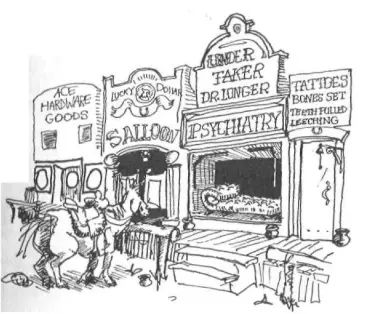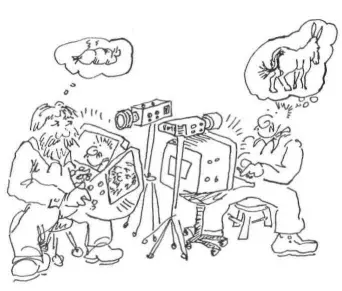Richard Bandler - Using Your Brain —for a CHANGE
- Название:Using Your Brain —for a CHANGE
- Автор:
- Жанр:
- Издательство:Real People Press
- Год:1985
- Город:Moab, Utah
- ISBN:0–911226–26–5
- Рейтинг:
- Избранное:Добавить в избранное
-
Отзывы:
-
Ваша оценка:
Richard Bandler - Using Your Brain —for a CHANGE краткое содержание
Bandler is an innovator and an original thinker in the field of psychology. This book is a transcript of Bandler live in front of an audience, cutting up and cracking jokes as he is prone to do, talking about some of his unique and often practical views on how you can change your feelings, thoughts and behavior. Change is often easier than you think if you use the right method.
Using Your Brain —for a CHANGE - читать онлайн бесплатно полную версию (весь текст целиком)
Интервал:
Закладка:
The first thing I saw there was somebody sitting and talking to an empty chair. I thought, "Oohhh! I was right. They are crazy." And then there was this other nut telling him what to say to the empty chair! Then I got worried, because everybody else in the room was looking at the empty chair, too, as if it were answering! The therapist asked, "And what does he say?" So I looked at the chair, too. Later I was told that it was a room full of psychotherapists, so it was OK.
Then the therapist said, "Are you aware of what your hand is doing?" When the guy said "No," I cracked up. "Are you aware of it now?" "Yes." "What is it doing? Exaggerate that movement." Strange, right? Then the therapist says "Put words to it." "I want to kill, kill." This guy turned out to be a neurosurgeon! The therapist said "Now, look at that chair, and tell me who you see." I looked, and there was still nobody there! But the guy looked over there and snarled, "My brother!"
"Tell him you're angry."
"I'm angry!"
"Say it louder."
"I'm angry!"
"About what?"
And then he starts telling this empty chair all these things that he's angry about, and then he attacks it. He smashes the chair to bits, and then apologizes, and works it out with the chair, and then he feels better. Then everyone in the group says nice things to him and hugs him.
Since I had been around scientists and murderers, I could act like everything was normal almost anywhere, but I was having trouble. Afterwards I asked the other people, "Was his brother really there?"
"Some of them said, "Of course he was."
"Where did you see him?'
"In my mind's eye."
You can do just about anything. If you act as if it's normal, other people will too. Think about it. You can say "This is group psychotherapy," put chairs around in a circle, and say "This chair is the 'hot seat.' " Then if you say "Who wants to work?" everybody will start to get nervous while they wait. Finally someone who gets motivated when stress builds up to a certain point can't take it anymore: "I want to work!" So you say, "That chair's not a good enough place to do it. You come and sit in this special chair." Then you put an empty chair across from him. Often you'd start in the following way:
"Now, tell me what you're aware of."
"My heart is pounding."
"Close your eyes, and tell me what you're aware of." "People are watching me."
Think about that for a minute. When his eyes are open, he knows what's going on inside; when his eyes are shut, he knows what's going on outside! For those of you who aren't familiar with Gestalt Therapy, this is a very common phenomenon.
There is a time and a place where people believed that talking to an empty chair was meaningful, and in fact it was. It can accomplish certain useful things. It was also very dangerous in ways they didn't understand, and many people still don't. People learn repeated sequences of behavior, and not necessarily the content. The sequence you learn in Gestalt Therapy is the following: When you feel sad or frustrated, you hallucinate old friends and relatives, become angry and violent, and then you feel better and other people are nice to you.
Take that sequence and translate it into the real world without the content. What does the person learn? When he's not feeling good, hallucinate, get angry and violent, and then feel good about it. How's that for a model for human relationships? Is that how you want to relate to your wife and children? But why take it out on a loved one? When you're furious, just go out and find a stranger. Walk up to him, hallucinate a dead relative, beat the snot out of him, and feel better. Some people actually do that, even without the benefit of Gestalt Therapy, but we don't usually think of that pattern of behavior as a cure. When people go through therapy, or any other repeated experience, they learn whatever's done really quickly, and they learn the pattern and sequence of what's done more that the content. Since most therapists focus on content, they usually won't even notice the sequence they're teaching.
Some people will look you straight in the eye and tell you the reason they are the way they are is because of something that happened long ago in their childhood. If that's true, they are really stuck, because of course then nothing can be done about it; you can't go have your childhood again.
However, the same people believe that you can pretend you are having your childhood again, and that you can go back and change it. The fact that you don't like what happened means that the event is "unfinished," so you can go back and "finish" it in a way that you like better. That's a great reframe, and it's a very useful one.
I think everything is unfinished in this sense: you can only maintain any memory, belief, understanding, or other mental process from one day to the next if you continue to do it. Therefore, it's still going on. If you have some understanding of the processes that continue to maintain it, you can change it whenever you don't like it.
It's actually quite easy to modify past experiences. The next thing I'd like to teach you is what I call "briefest therapy." One nice thing about it is that it's also secret therapy, so you can all try it now.
Think of an unpleasant embarrassment or disappointment, and take a good look at that movie to see if it still makes you feel bad now. If it doesn't, pick another one. . . .
Next, start that movie again, and as soon as it begins, put some nice loud circus music behind it. Listen to the circus music right through to the end of the movie. . . .
Now watch that original movie again. . . . Does that make you feel better? For most of you it will change a tragedy into a comedy, and lighten your feelings about it. If you have a memory that makes you annoyed and angry, put circus music with it. If you run it by with circus music, the next time it comes back it will automatically have the circus music with it, and it won't feel the same. For a few of you, circus music may be an inappropriate choice for that particular memory. If you didn't notice any change, or if your feelings changed in an unsatisfactory way, see if you can think of some other music or sounds that you think might impact that memory, and then try playing that music with your memory. You could try a thousand soap–opera violins, or opera music, the 1812 Overture, "Hernando's Hideaway," or whatever, and find out what happens. If you start experimenting, you can find lots of ways to change your experience.
Pick another bad memory. Run the movie however you usually do, to find out if it bothers you now- . . .
Now run that same memory backwards, from the end back to the beginning, just as if you were rewinding the film, and do it very quickly, in a few seconds. . . .
Now run the movie forward again. . . .
Do you feel the same about that memory after running it backwards? Definitely not. It's a little like saying a sentence backwards; the meaning changes. Try that on all your bad memories, and you'll save another thousand dollars worth of therapy. Believe me, when this stuff gets known, we're going to put traditional therapists out of business. They'll be out there with the people selling magic spells and powdered bat wings.

III. Points of View

People often say "You're not looking at it from my point of view," and sometimes they're literally correct. I'd like you to think of some argument you had with someone in which you were certain you were right. First just run a movie of that event the way you remember it. ...
Now I want you to run a movie of exactly the same event, but from the point of view of looking over that other person's shoulder, so that you can see yourself as that argument takes place. Go through the same movie from beginning to end, watching from this viewpoint. . . .
Did that make any difference? It may not change much for some of you, especially if you already do it naturally. But for some of you it can make a huge difference. Are you still sure you were right?
Man; As soon as I saw my face and heard my tone of voice, I thought, "Who'd pay any attention to what that turkey is saying!"
Woman: When I was on the receiving end of what I'd said, I noticed a lot of flaws in my arguments. I noticed when I was just running on adrenalin and wasn't making any sense at all. I'm going to go back and apologize to that person.
Man: I really heard the other person for the first time, and what she said actually made sense.
Man: As I listened to myself I kept thinking, "Can't you say it some other way, so that you can get your point across?"
How many of you are as certain about being right as you were before trying this different point of view? . . . About three out of 60. So much for your chances of being right when you're certain you are — about 5%.
People have been talking about "points of view" for centuries. However, they've always thought of it as being metaphorical, rather than literal. They didn't know how to give someone specific instructions to change his point of view. What you just did is only one possibility out of thousands. You can literally view something from any point in space. You can view that same argument from the side as a neutral observer, so that you can see yourself and that other person equally well. You can view it from somewhere on the ceiling to get "above it all," or from a point on the floor for a "worm's eye" view. You can even take the point of view of a very small child, or of a very old person. That's getting a little more metaphorical, and less specific, but if it changes your experience in a useful way, you can't argue with it.
When something bad happens, some people say, "Well, in a hundred years, who'll know the difference?" For some of you, hearing this doesn't have an impact. You may just think, "He doesn't understand." But when some people say it or hear it, it actually changes their experience and helps them cope with problems. So of course I asked some of them what they did inside their minds as they said that sentence. One guy looked down at the solar system from a point out in space, watching the planets spin around in their orbits. From that point of view, he could barely see himself and his problems as a tiny speck on the surface of the earth. Other people's pictures are often somewhat different, but they are similar in that they see their problems as a very small part of the picture, and at a great distance, and time is speeded up—a hundred years compressed into a brief movie.
All around the world people are doing these great things inside their brains, and they really work. Not only that; they're even announcing what they're doing. If you take the time to ask them a few questions, you can discover all sorts of things you can do with your brain.
There is another fascinating phrase that has always stuck in my mind. When you're going through something unpleasant, people will often say, "Later, when you look back at this, you'll be able to laugh." There must be something that you do in your head in the meantime that makes an unpleasant experience funny later. How many people in here have something you can look back on and laugh at? ... And do you all have a memory that you can't laugh at yet? . . . I want you to compare those two memories to find out how they're different. Do you see yourself in one, and not in the other? Is one a slide and one a movie? Is there a difference in color, size, brightness, or location? Find out what's different, and then try changing that unpleasant picture to make it like the one that you can already laugh at. If the one that you can laugh at is far away, make the other one far away too. If you see yourself in the one you laugh at, see yourself in the experience that is still unpleasant. My philosophy is: Why wait to feel better? Why not "look back and laugh" while you're going through it in the first place? If you go through something unpleasant, you would think that once is more than enough. But oh no, your brain doesn't think that. It says "Oh, you fouled up. I'll torture you for three or four years. Then maybe I'll let you laugh."
Читать дальшеИнтервал:
Закладка:








